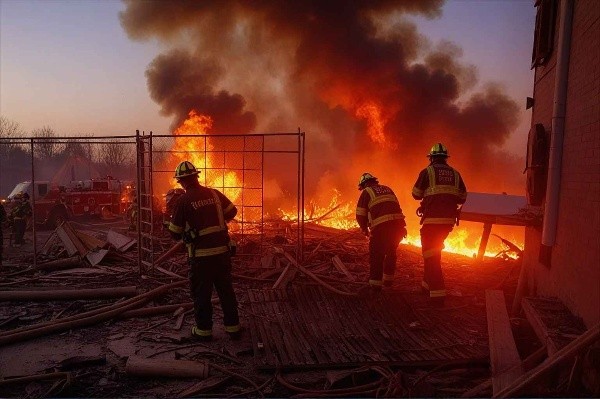Iran’s Unyielding Stance Against Israeli Aggression: A Complex Geopolitical Struggle
In the eyes of many, the Islamic Republic remains the last bastion in the Muslim world against unchecked Israeli aggression
Loading...

US failure to end Gaza war and prevent escalation in Lebanon is leading the region to all-out war, analysts say.
Diplomatic Efforts and Unintended Consequences
A week before the devastating Israeli attacks on Lebanon, US President Joe Biden's envoy, Amos Hochstein, visited the region. His mission was to de-escalate the increasing tensions at the Israel-Lebanon border, where exchanges of fire between Hezbollah and Israeli forces threatened to spiral into a full-scale war. However, shortly after his arrival, a series of booby-trapped communication devices detonated across Lebanon, causing widespread casualties. The timing of these events has led analysts to question the efficacy of US diplomatic efforts and their unintended consequences.
Khaled Elgindy, a senior fellow at the Middle East Institute, highlights a disturbing trend where Israeli leadership appears to disregard US diplomatic warnings without facing any repercussions. "This pattern reflects a disastrous failure of US policy," Elgindy remarked, pointing out that this is not an isolated incident but part of a broader issue in US-Israeli relations.
The Gaza Conflict and Its Spillover Effects
The conflict in Lebanon is inextricably linked to the ongoing war in Gaza. Despite US President Joe Biden’s stated priority to prevent a regional war, the US continues to provide unwavering support to Israel, even as the violence threatens to spill over into neighboring countries. The conflict in Gaza has claimed over 41,400 Palestinian lives and shows no signs of abating.
Hezbollah has justified its attacks on Israeli military targets as a means to pressure Israel into ceasing its offensive in Gaza. In response, Israel has intensified its military actions in Lebanon, targeting Hezbollah fighters and bombing Lebanese villages. This has further complicated US efforts to broker a ceasefire in Gaza, as Israeli Prime Minister Benjamin Netanyahu appears resistant to negotiations, a stance that some experts say is influenced by his need to appease far-right coalition partners.
US Support and Regional Implications
James Zogby, president of the Arab American Institute, criticized the Biden administration for enabling Netanyahu’s aggressive policies, which he argues are intended to ensure Netanyahu's political survival rather than achieve peace. Zogby warns that the escalation in Lebanon could have severe consequences, stating, "It’s on the hands of the administration."
Further complicating the situation is the Biden administration’s close alignment with Israeli policy regarding Lebanon. Despite calls for de-escalation, the US has remained largely silent or supportive in response to Israeli military actions, including airstrikes in Beirut and the detonation of communication devices across Lebanon, which have resulted in civilian casualties. The lack of US condemnation of these actions has drawn criticism from legal experts and human rights advocates.
The Human Toll and International Law
The humanitarian impact of these conflicts is devastating. The displacement of thousands of people due to clashes along the Israel-Lebanon border is a grim reminder of the human cost of war. The recent Israeli airstrike that killed a senior Hezbollah commander in Beirut, along with dozens of civilians, including children, has only worsened the humanitarian crisis.
The US’s muted response to these events has raised questions about its commitment to international humanitarian law. Legal experts argue that the attacks likely violate these laws, yet the Biden administration has refrained from attributing responsibility or condemning the actions.
Regional Stability and Future Prospects
Despite official statements that the US seeks to prevent a wider conflict, the actions on the ground tell a different story. The Pentagon's downplaying of the situation as not yet constituting a regional war contrasts sharply with the reality on the ground, where violence intensifies across multiple fronts. Reports have emerged suggesting that US officials support Israel’s strategy of "de-escalation through escalation," a concept wherein increased military action is seen as a means to achieve longer-term stability.
Elgindy and other analysts warn that the US’s refusal to exert pressure on Israel undermines its own policy goals and risks further destabilizing the region. The shifting narrative and redefinition of what constitutes a regional escalation indicate a reluctance to confront the reality of the situation.
The Value of Human Lives
The disparity in responses to casualties on different sides of the conflict highlights a troubling aspect of US foreign policy. As Zogby points out, the US appears to place different values on Arab and Israeli lives, a perspective that fuels resentment and exacerbates regional tensions.
In conclusion, the Middle East stands at a precarious crossroads. The combination of US diplomatic failures, unwavering support for Israel, and the resultant emboldening of Israeli actions in Lebanon and Gaza threaten to push the region into further chaos. Without a reassessment of policies and a genuine commitment to peace and humanitarian considerations, the risk of a broader conflict looms large.
Editor
In the eyes of many, the Islamic Republic remains the last bastion in the Muslim world against unchecked Israeli aggression
Analysts say US push for Gaza post-war phase is ‘unrealistic’ as Israel vows to continue fighting in besieged territory.
And recent Iraqi history can tell us how.
